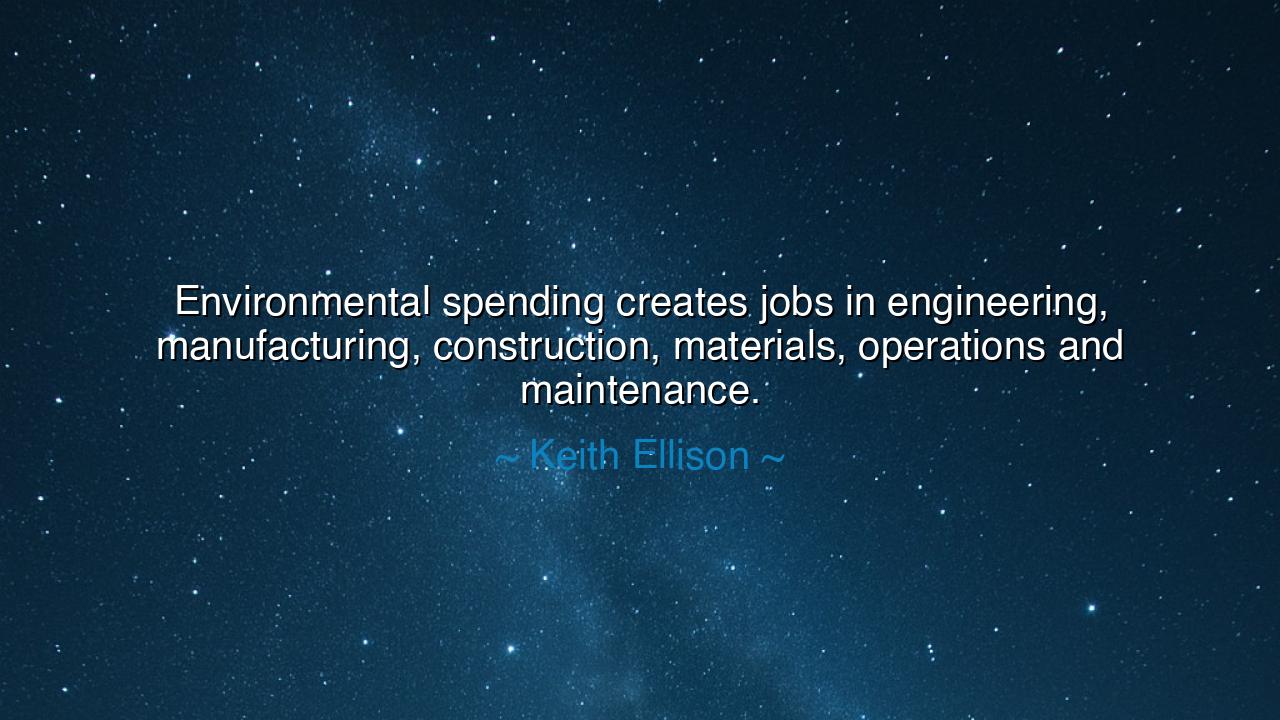
Environmental spending creates jobs in engineering
Environmental spending creates jobs in engineering, manufacturing, construction, materials, operations and maintenance.






Hearken, O seekers of truth, to the words of Keith Ellison, who proclaimed with clarity: “Environmental spending creates jobs in engineering, manufacturing, construction, materials, operations and maintenance.” This statement, though simple in its cadence, carries the weight of a great teaching. For it tells us that care for the earth is not merely a sacrifice, nor a burden upon prosperity, but a fountain from which new labor, new wealth, and new dignity may flow. To heal the world is also to strengthen the hands of those who build it.
The origin of this truth lies in the long history of human toil. From the ancients who built aqueducts to carry pure water, to the engineers who designed windmills to harness the breath of the sky, there has always been a union between environmental care and human labor. Ellison reminds us that this union is not of the past alone but of the present and future. In an age when pollution darkens skies and the earth groans under exploitation, the act of investing in renewal—clean energy, sustainable infrastructure, the stewardship of land and water—is also an act of employment. Thus, the green path is not only ethical but practical, for it feeds both the planet and the people.
Consider the mighty story of Roosevelt’s New Deal in the time of the Great Depression. Millions of men and women were without work, despair shadowed every home, and the nation trembled. Yet through the Civilian Conservation Corps and public works programs, forests were replanted, rivers were dammed, and soil was preserved. Here, too, was environmental spending that created dignity and livelihood. It was not charity, but transformation: by caring for the land, the people found renewal for themselves. Ellison’s words echo this ancient pattern—that when we invest in earth, we invest in humanity.
And think of the modern rise of solar power and wind energy, industries that have brought thousands into new crafts—engineers designing turbines, manufacturers forging panels, construction workers raising towers that drink from the sky, maintenance crews keeping the eternal dance of blades alive. These are not abstract ideals, but living testimonies to the power of aligning human ambition with the rhythms of the earth. Where once jobs were bound to the burning of coal and oil, now they are reborn in service of the sun and wind. Thus, sustainability does not kill industry; it transforms it.
Yet there are those who whisper fear, claiming that to spend on the environment is to bleed wealth away, that to go green is to go poor. Ellison’s words strike against this illusion. For true poverty is found not in the creation of clean labor, but in the devastation wrought by neglect—the crumbling bridges, the poisoned waters, the sickened children, the storms that ravage unprepared cities. What economy thrives when its fields turn to desert, when its coasts are swallowed by the sea? Thus, investment in the earth is the most enduring economy, a wealth that does not vanish but multiplies across generations.
The lesson is plain: to spend upon the environment is to weave prosperity into the very fabric of society. It is to create jobs that not only fill pockets but also uplift communities, protect health, and preserve the inheritance of children yet unborn. It is the blending of necessity with virtue, of survival with dignity. And this, O listener, is the deepest wisdom—that what is just and what is profitable need not be enemies, but can be allies when guided by foresight.
Therefore, let each person act as steward. Support policies that fund green infrastructure and clean energy. Choose, when possible, the works of those who build with respect for the earth. Encourage leaders who see the bond between economic vitality and environmental care. In your own life, plant seeds both literal and figurative, for each small act of sustainability adds strength to the greater whole.
So take Ellison’s words as both promise and command: that the path of environmental spending is not the path of sacrifice, but of creation—creation of work, of stability, of hope. To invest in the earth is to invest in ourselves, to ensure that the hands of laborers find noble tasks, that communities thrive, and that the world we pass down is both livable and abundant. This is not only wisdom—it is destiny, if we dare to choose it.






AAdministratorAdministrator
Welcome, honored guests. Please leave a comment, we will respond soon